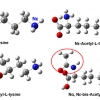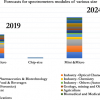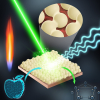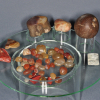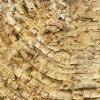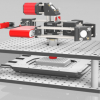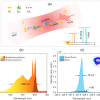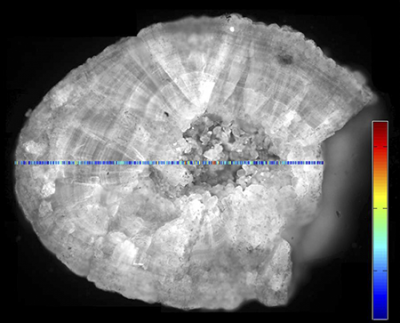
Many people around the world are affected by kidney stone disease. The number of new cases in western European countries has tripled in the last 10 years. Kidney stones are often no larger than a grain of rice, yet some can grow to a diameter of several centimetres. Sometimes a urinary stone can block the ureter, causing significant pain. If it cannot be dissolved, the kidney stone is treated using extracorporeal shock-wave therapy or through minimally invasive endoscopic modalities.
Many patients suffer from recurrence of the disease and need retreatment, but studies have shown that new stone formation can be reduced by 50% if personalised follow-up care and proper metaphylaxis measures are offered to the patient. The recommendations regarding dietary habits or the use of particular medication strategies are based on the knowledge of the stone composition. In collaboration with an industrial partner and the Division of Urotechnology, University Medical Center Freiburg, researchers at the Fraunhofer Institute for Physical Measurement Techniques IPM are developing a novel Raman spectroscopy based diagnostic system for rapid and automated analysis of kidney stones, thus significantly improving patient follow-up care after stone treatment. Fraunhofer researchers in this project are working hand in hand with urologists specialised in modern methods of treating urinary stone disease.
“Only a small number of kidney stone patients receive a comprehensive consultation and follow-up after they have been treated”, said physician and researcher Dr Arkadiusz Miernik at Fraunhofer IPM. This may be because conventional stone analysis technologies such as infrared spectroscopy are costly and time-consuming, including preparation of stone samples. Analysis can also only be performed in a dedicated laboratory facility. Since only a few centres offer this type of analysis, it can take up to three weeks to receive results. “The patient in most cases has already been discharged and will not be seeing the doctor again. We advise stone patients to drink plenty of fluids, increase physical activities and lose weight if necessary. Unfortunately this is only a general recommendation. From the clinical point of view we need individualised approaches and these must include results of a compositional analysis of the stone. This allows us to evaluate the individual risk of disease recurrence and detect potential metabolic abnormalities”, said Miernik.
Miernik and his team use Raman spectroscopy to rapidly characterise and conclusively identify specific stone types. This works on wet, unprepared samples, so the time taken to prepare specimens is substantially reduced. “The stones previously had to be dried and pulverised prior to analysis. Our system makes this unnecessary. Stone fragments collected during the surgical procedure do not need to be further processed. They can in principle be put directly into the Raman spectrometer for analysis”, explains Miernik.
A demonstration system, including the hardware and software required for stone analysis developed by the Fraunhofer IPM researchers, already exists as a prototype. This prototype must first be made more compact before it is ready for the market. A unique feature of the system is its spectral database. An information index has been built up of data on the nine pure substances making up 99% of urinary stones. The researchers examined nearly 160 kidney stone samples in setting up the software during the first validation phase. Moreover, the results were confirmed after a conventional infrared based analysis in a reference laboratory. “Once the complete system is ready for clinical use, the physician (urologist) will be able to examine stone samples directly after surgical intervention on his own, thus increasing the quality of patients’ care substantially”, says Miernik.








